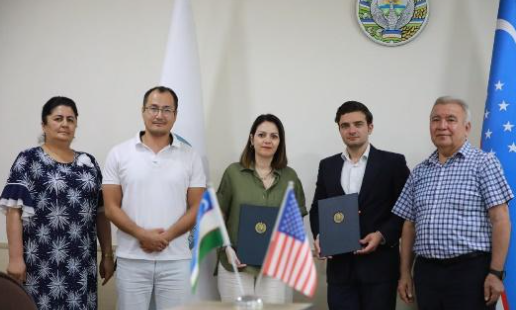When graduate student Rock Aboujaoude, Jr. set out for Central Asia this summer, his goal was clear: expand the international scope of his dissertation on carbon farming and regenerative agriculture while exploring opportunities for long-term partnerships with universities in the region. Supported by the UF International Center through the Research Abroad for Doctoral Students (RADS ) and advised by Dr.Michael Kung: (UFIC’s Office for Global Research Engagement), Dr. Sadie Hundemer (Asst. Professor, Agricultural Education & Communication) and Dr. John Capece (former UF faculty and Executive Director of AEL), Rock’s journey took him to both Tajikistan and Uzbekistan—and along the way, opened doors to exciting new collaborations.
The trip began with a twist. A visa delay kept Rock from entering Uzbekistan as planned, so he adjusted his itinerary and landed first in Dushanbe, Tajikistan. There, he was warmly welcomed by Mr. Farkhod Abduvohidov, a longtime colleague of Dr. Capece. What might have been “lost time” instead became an unexpected opportunity: Mr. Abduvohidov introduced Rock to local leaders and universities, sparking ideas for future partnerships and research.
Once his visa was approved, Rock entered Uzbekistan, with Mr. Abduvohidov traveling alongside him to ensure smooth introductions at his next destination.
Rock’s first stop in Uzbekistan was Samarkand State Agricultural University (SamDAQU), one of the country’s leading agricultural institutions.With more than 10,000 students and 500 faculty members, SamDAQU is poised for growth—launching a new Agriculture Division with support from the United Nations. There, Rock was welcomed by Vice Rector Dr. Abror Gadayev, who has strong ties to UF dating back to his time as a Fulbright scholar in Florida. Rock also met with Rector Dr. Cigdem Canbay Turkyilmaz and other university leaders.
The timing of the visit couldn’t have been better. SamDAQU is eager to contribute to the UN Food Systems Advisory Group and to build models for regenerative agriculture tailored to Central Asia’s unique environment. For Rock, the enthusiasm he encountered confirmed that SamDAQU would be a valuable partner for student-led research teams and comparative studies with Florida.

Dr. Cigdem Turkyilmaz and Rock Aboujaoude, Jr.discuss agricultural changes and potential partnerships.
Next, Rock traveled to Tashkent to visit Green University, Uzbekistan’s newest institution dedicated to climate change, sustainability, and environmental management. Backed by the Green Climate Fund, Green University is positioning itself as a regional hub for research and policy development. Rock was greeted by Vice Rector Shahriyor Nurulloev (now Acting Rector), who shared the university’s ambitious plans to grow quickly and to partner with international institutions. Discussions focused on ways UF researchers might advise on carbon farming, regenerative agriculture, and climate adaptation policies.
One of the trip’s biggest outcomes was the discussion of a Memorandum of Understanding (MoU) between both SamDAQU and Green University with Alpha Epsilon Lambda (AEL), the national graduate honor and research society. Founded at UF in 1990 by Dr. Capece, AEL provides a framework for international collaboration. MoUs create immediate opportunities for student research teams and faculty collaboration, while also paving the way for possible institutional partnerships with UF in the future.
What began as an exploratory trip quickly evolved into concrete opportunities:
-
Launching joint student and faculty research projects.
-
Advising on sustainability policy in Uzbekistan.
-
Expanding international visibility through events like COP30.
-
Laying the groundwork for future UF partnerships.
For Rock, the hospitality and enthusiasm he experienced in Samarkand and Tashkent exceeded expectations. These collaborations will not only enrich his dissertation but also strengthen UF’s role in advancing global research partnerships.

Rector Abror Gadeev and Head of Research Prof. Abdul Hamid with Rock Aboujaoude, Jr.
About AEL
Alpha Epsilon Lambda (AEL) is the national graduate honor and research society dedicated to fostering academic excellence and international collaboration among graduate students. With chapters at more than 47 universities, AEL has a proud legacy of supporting global engagement. Rock currently serves as National Vice President, and through AEL, he was able to formalize new research collaborations in Uzbekistan that will benefit both UF students and the broader international community.
About the RADS Program
Offered by the UF International Center, the RADS program provides a unique opportunity for research conducted in international settings. RADS provides travel and funding for accommodations for doctoral students to travel abroad to collect data or to access resources not available on campus. The extent of time can range from one week to several months. This opportunity can provide access to human subjects, physical specimens, or laboratory facilities for their research; it enables a better understanding for the cultural assumptions that form the foundation of their unique research focus. For more information, visit the RADS program webpage.

